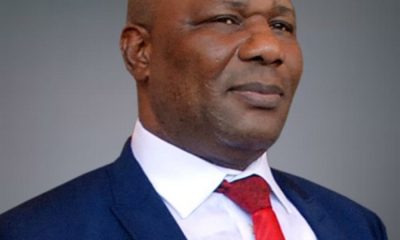JUDICIARY
Supreme Court Reserves Judgment in the Funding of Courts Suit by 36 States

The Supreme Court has reserved judgment in the suit filed by the Attorneys General of the 36 states querying the legality of the Presidential Executive Order 10, 2020.
President Buhari had in the Executive Order he signed on May 22, 2020, made it mandatory for all states to include allocations of both the legislature and the judiciary in their Appropriation Laws.
This he said was in compliance with Section 121(3) of the 1999 Constitution (as Amended).
A seven-man panel of justices of the apex court led by Justice Musa Datijo, reserved their judgment after listening to arguments canvassed by all the parties.
The states through their attorneys-general in a suit marked SC/655/2020, where the Attorney -General of the Federation was listed as the sole respondent, posed two questions for the Supreme Court to determine.
“Whether having regards to the provisions of Section 6 and 81(3) of the Constitution read together with item 121(3) of the third schedule, the defendant is not constitutionally obligated and or charged with the responsibility for funding all capital and recurrent expenditure of the High Courts, Sharia Courts of Appeal and Customary Courts of Appeal at the states of the Federation being courts created under Section 6 of the constitution.
“Whether considering provisions of Section 6, 80, 81, 120 and 121 whether the Presidential Executive order number 10 of 2020 made by the president on May 22, 2020 to compel the plaintiffs to fund State High Courts, States Sharia Courts of Appeal and Customary Courts of Appeal in violation of the Constitutional provisions vesting responsibility for funding the said courts on the federal government is not unconstitutional and unlawful.”
At the resumed hearing on Monday, while adopting their processes, counsel to the plaintiffs, Mr Augustine Alegeh, SAN, argued that salaries, emoluments, remuneration and allowances of judges, were not supposed to be in any appropriation bill.
Alegeh submitted that under Section 84(4) of the 1999 Constitution, (as amended), funds for such expenditure, were charged and captured in the consolidated revenue fund, not in the budget.
“Our position is that funds meant for the judiciary should be taken from the consolidated revenue fund and handed to the National Judicial Council (NJC) for disbursement to heads of courts as stipulated in Section 6 of the Constitution.
“We have to admit to ourselves that what we are practicing in this country is constitutional democracy and not true federalism”, Alegeh said.
He told the court that his clients had so far, spent about N66 billion in the maintainance of state courts, and he demanded for a refund of the money.
For his part, counsel to the AGF, Mr Tijjani Gazali, SAN, the Acting Director, Civil Appeals, Federal Ministry of Justice, told the court that he filed a preliminary objection and a counter-affidavit in vehement opposition to the suit.
He said the Executive Order 10 was based on a judgement of the Federal High Court that ordered financial autonomy for the judiciary at the state level.
Gazali contended that the said judgement followed a suit that was filed by the Judiciary Staff Union of Nigeria, (JUSUN), in which the NJC, the AGF and the AG of all the 36 states, were listed as respondents.
“My Lords, up to this moment, there is no appeal against that judgement, which they are now contending is different from this suit”, Gazali said.
He added that the plaintiffs suit was a gross abuse of the court process and urged the court to dismiss the suit with reasonable cost.
Alegeh, however, prayed the court to discountenance the argument by the AGF, stressing that JUSUN as a body, lacked the locus-standi to file a suit in any dispute between the state and the federal government.
Meanwhile, five Senior Advocates of Nigeria, SANs, Adegboyega Awomolo, Olisa Agbakoba, Sebastian Hon, Mahmud Magaji and Musibau Adetunbi, announced appearances as amicus curiae (friends of the court).
The Supreme Court invited them to offer their legal opinion on the matter.
In his submission, Awomolo, relied on Sections 81(3), 84(4) and (7), as well as Paragraph 21(e) of the Third Schedule to the Constitution, to argue that the Presidential Executive Order 10, 2020, was unconstitutional.
He said the order could be likened to the one former President Olusegun Obasanjo issued in 2004, which barred Lagos State from benefiting from the federation account.
The senior lawyer maintained that the federal government was constitutionally mandated to take care of both capital and recurrent expenditure of all the courts established for the federation, both states and federal courts.
For his part, Agbakoba, maintained that both the federal government and all the 36 states had in the past 20 years, violated provisions of the Constitution.
Though he urged the Supreme Court to uphold the suit by states, he, however, kicked against their request for a refund of about N66billion.
Agbakoba, urged the apex court to restore Section 162(9) of the Constitution which he said the court wrongly struck down in a suit involving the attorney-general of Abia and the AGF.
“I urge my lords to use this case to break the shackles of the judiciary, I believe that this is an opportunity for the judiciary to finally set itself free,” he said.
Hon, for his part, threw his weight behind the suit by the 36 states and urged the apex court to nullify the Presidential Executive Order 10, 2020.
Magaji said he disagreed with the submission of plaintiffs that the federal government should take care of capital expenditures incurred in funding of state courts.
He argued that no where in the Constitution was it expressly stated that such expenditure should rest on the federal government’s shoulder.
“I am therefore urging my lords to resist the temptation of imputing into the constitution, what is not there,” he said.
Adetunbi, argued that while Section 84(7) of the Constitution, mandated the federal government to pay salaries and emoluments of state courts, under Section 121 (3), the plaintiffs were required to take care of capital expenditure of the courts.
The matter has been adjourned to a date to be communicated to the parties.
The states through their attorneys-general argued that the president, by virtue of the said Executive Order, pushed the federal government’s responsibility of funding both the capital and recurrent expenditures of the state high courts, Sharia Court of Appeal, and the Customary Court of Appeal, to the state governments.
They maintained that the order was a clear violation of Sections 6 and 8(3) of 1999 Constitution, placed the responsibility of funding the listed courts on the federal government.
The 36 states contended that they had been funding capital projects in the listed courts since 2009 and prayed the Supreme Court to order the federal government to make a refund to them.
They argued in their statement of claim that since 2009, the the federal government had not funded the capital and recurrent expenditures of the state high courts, Sharia Court of Appeal and the Customary Court of Appeal of their states.
According to them the federal government has only paid the salaries of the judicial officers of the listed courts.
They posited that Section 81(3) of the 1999 Constitution, made provision for the federal government to fund the courts.
“That item 21(e) of the Third Schedule to the 1999 Constitution provides that the National Judicial Council (NJC) is to collect from the defendant and disburse all capital and recurrent expenditure in respect of all the courts established under Section 6 of the same constitution.
“That section 12(3) of the constitution makes provision for all capital and recurrent expenditures for court not established under Section 6 of the constitution by the respective plaintiff’s states,” they said.
The plaintiff prayed the Supreme Court to quash the Executive Order 10 as well as make an order compelling the federal government to henceforth, fund both capital and recurrent expenditures of the courts. (NAN)
JUDICIARY
Court Acquits Medical Doctor of Cybercrime Charges

The Federal High Court in Abuja has dismissed cybercrime charges filed by the Inspector-General of Police against a female medical doctor, Bolanle Aseyan. Delivering judgment on Friday, Justice Peter Lifu discharged and acquitted Aseyan, stating that the police failed to prove the essential elements of the alleged offences.
The Inspector-General had arraigned Aseyan on a four-count charge of defamation, harassment, and intimidation against another doctor, Olufunmilayo Ogunsanya. The police alleged that Aseyan used social media platforms to harm Ogunsanya’s reputation. He was said to be her former boyfriend. The charges were filed under Section 24 of the Cybercrime (Prohibition, Prevention) Act, which addresses online threats and cyber harassment. To support the case, the police presented three witnesses. Aseyan also called two witnesses to testify in her defence during the trial. Justice Lifu, while reviewing the matter, noted both doctors were once in a romantic relationship before it turned sour. He further observed that the two had sexual relations while in the United Kingdom and later made conflicting social media posts against each other. The judge held that the prosecution failed to prove its case beyond reasonable doubt and therefore could not secure a conviction. Specifically, the judge said the defendant’s alleged Twitter handle used in the cyberbullying was not tendered as evidence before the court. Justice Lifu also said there was no proof of threats or intimidation, but rather evidence of a previous affectionate relationship. Consequently, the judge dismissed all four charges, discharged and acquitted Aseyan, and declared the case closed. He ordered the police to immediately return all seized items, including her international passport, upon service of the judgment. Aseyan said she met Ogunsanya online in 2019 and travelled to the United Kingdom in 2020, where she claimed she was raped. She stated that upon arrival in Leeds on March 7, 2020, tired and disoriented, Ogunsanya offered her wine shortly after she got to his home. She alleged that after taking the drink, she passed out and later woke up to find that he had allegedly had sex with her without consent. Aseyan further claimed that Ogunsanya maltreated her before she returned to Nigeria shortly after the alleged incident. (NAN)JUDICIARY
Kwara Court Sentences Abdulrahman Bello to Death by Hanging for Murder of Hafsoh Lawal.

From Abdullahi Abubakar, Ilorin.
A Kwara State High court sitting in Ilorin has sentenced Abdulrahman Bello, a self-acclaimed cleric and the killer of Hafsoh Lawal, a final year student of the Kwara State College of Education to death, by hanging. This was contained in a judgement delivered by Justice Hannah Ajayi on Thursday, in which, four other defendants were set free and cleared of any wrongdoings.
Charged with five-count, the judge started by acquitting the four out of the five defendants namely Ahmed Abdulwasiu, Jamiu Uthman, Suleiman Muyideen and Abdulrahman Jamiu of any complicity, subsequently setting them free of taking part in the death of the victim (Hafsoh Lawal).
However, Justice Ajayi, while delivering judgment on the main culprit, described Bello’s act as cruel, wicked, and an extreme display of human wickedness, saying all evidence proved that Hafsoh was killed in order to be used for money ritual and trading in human parts.
The judge further noted that Abdulrahman’s confession of love and plan to marry the victim, are all concocted lies to lure her to his residence in order to kill her. She therefore sentenced Abdulrahman Bello to death by hanging while setting free the other four suspects not guilty.
It would be recalled that the victim went missing, sometimes in February 2025, shortly after attending the naming ceremony of a family member. When she left, but didn’t return later in the day, her parents went into panic mode, and search party was raised, and a complaint was lodged at the police station.
Her phone line was tracked, and traced to the suspect’s (as it were) area. Upon invitation and interrogation, it was discovered that he is a serial killer, who had killed many victims before Hafsoh.
JUDICIARY
Pastor Arraigned over Alleged Rape of Married Woman in Edo

From Joseph Ebi Kanjo, Benin
A 38-year-old pastor, Simeon Okehielem of the Synagogue Prayers Ministry has been arraigned before an Edo State High Court for allegedly raping a married woman, Isoken Vivian Aigbedo.
The pastor, who was accused of engaging in sexual relationships with married women within his congregation, was docked before the court in Benin City, on Thursday last week.
The charges against Pastor Okehielem followed a year 2022 incident in Uholor Community of Benin City where the cleric allegedly drugged and raped the woman leading to the birth of a child.
Recent DNA results reportedly confirmed the pastor as the biological father of the child, which prompted the Nigerian Police to re-arrest and formally arraign him.
The presiding judge, Justice Erhabor, granted an ex-parte order to remand the suspect at the Benin Correctional Custodial Centre for 14 days, pending legal advice from the Director of Public Prosecution (DPP), Ministry of Justice, Edo State.
The State Prosecutor, P.O. Odion told the court that the alleged offence occurred in February 2022.
Okehielem was slammed with two-count charge on alleged rape and administering a stupefying substance with the intent to commit a felony.
The charge sheet, marked Suit No: BLOD/2323M/2025, reads: “That you, Okehielem Simeon ‘m’, in or about the month of February 2022, in Benin City within the Benin Criminal Division, did rape one Mrs Isoken Vivian Aigbedo and thereby committed an offence contrary to Section 4, punishable under Section 5(1) of the Violence Against Persons (Prohibition) Law, 2021.
“That you, Okehielem Simeon ‘m’, in or about the month of February 2022, in Benin City within the Benin Criminal Division, with intent to commit a felony, administered a substance to stupefy one Mrs Isoken Vivian Aigbedo, thereby committing an offence punishable under Section 256 of the Criminal Law of Edo State, 2022.”
Speaking to journalists after the court session, the victim’s legal counsel, Clinton Ogbebor, applauded the Police for its diligence.
“We are in court today over the alleged rape of my client, Mrs Isoken Aigbedo, by one Pastor Simeon Okehielem,” he said.
Ogbebor confirmed that the case file would now be forwarded to the office of the DPP for legal advice, after which the trial will proceed accordingly.
The development has stirred debates across Benin City, with residents and religious leaders expressing shock and calling for justice.
The case has been adjourned pending further legal advice from the Director of Public Prosecution.




























